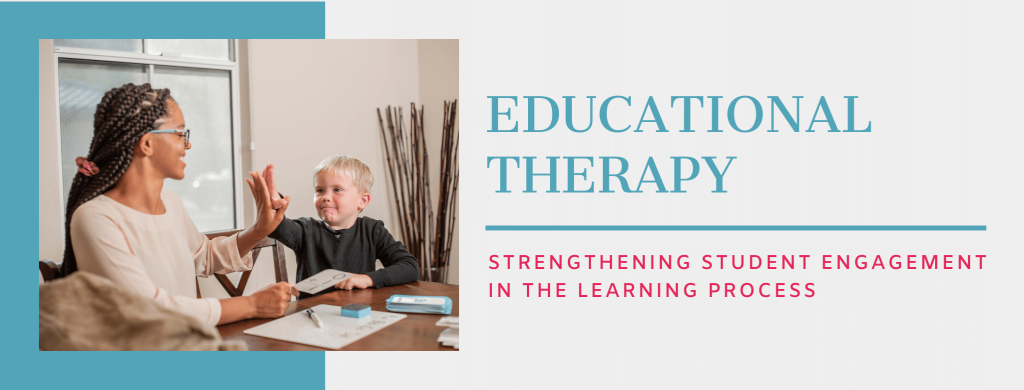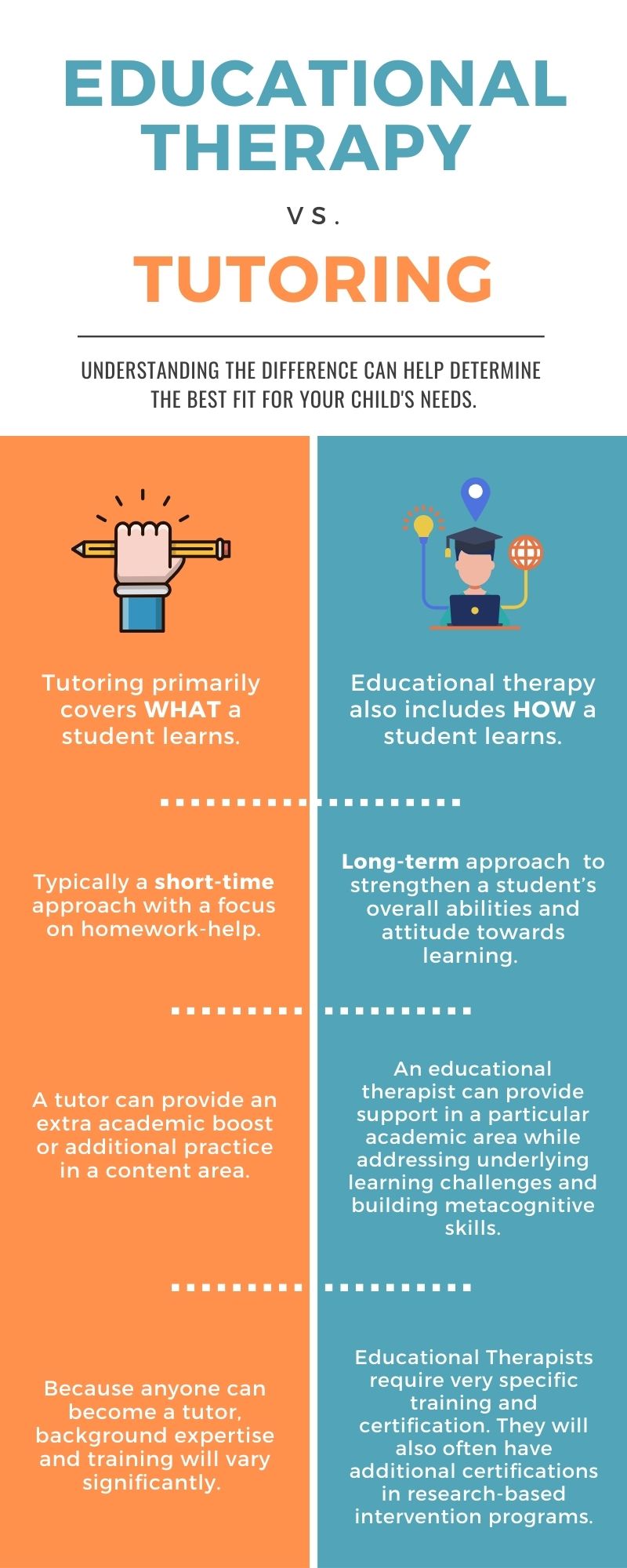No products in the cart.

What is Educational Therapy?
Educational Therapy combines therapeutic and teaching techniques to determine what helps and hinders learning. It uses evidence-based strategies, tools, and programs to support students based on his/her unique learning needs and strengths. While working with an educational therapist, students have the opportunity to discover how they take in, retrieve, and use information. In the process, they learn metacognitive strategies to recognize and adjust how they learn.
How is Educational Therapy Different from Tutoring?
The biggest difference between a Tutor and an Educational therapist is that a tutor primarily covers what a student learns, while educational therapy also includes how a student learns. Educational Therapists or specialists will also have the training and knowledge to conduct appropriate assessments to gather baseline data and tools for progress monitoring to ensure instruction is attuned to the needs of the child. They will also have a working knowledge of research-based intervention programs. Their holistic approach also allows them to not only support a student’s academics but social-emotional needs. 
What is the Goal of Educational Therapy?
The goal of educational therapy is to provide each student, regardless of ability, with the support needed to become an independent and confident learner. It addresses underlying learning difficulties through a variety of evidence-based interventions and helps students find their full potential.
Can Educational Therapy Help Address Learning Disabilities?
Educational therapy can help address a variety of learning disabilities including but not limited to ADHD, dyslexia, language processing disorder, auditory processing disorder, language processing disorder, math learning disability, dyscalculia, dysgraphia, nonverbal learning disabilities, poor working memory, executive functioning deficits, and learning related anxiety.
Does my Child Need Educational Therapy?
Whether your child would benefit most from working with an educational therapist is related to how the student thinks and performs. External factors, such as family and the school environment, also play a role. Does your child:
Struggle to stay focused or become easily distracted?
Know the subject matter but find it difficult to do well on a test?
Make frequent errors while reading?
Have a high level of anxiety over school or test-taking?
Need significant parental support to do homework?
If you answered yes to some of these questions, educational therapy can likely help your child.
Educational Therapy is Not Psychotherapy or Counseling.
Educational therapy primarily focuses on addressing academic and learning difficulties. Though we may address educational-related anxiety or trauma, we do not replace the role of a psychotherapist or counselor whose primary focus is to treat socio-emotional and psychological issues. Educational therapists may use a variety of educational and cognitive strategies to help individuals develop effective learning strategies, overcome learning obstacles, and build confidence related to their academic abilities but cannot diagnose or treat mental health-related concerns. Because academic difficulties can often be intertwined with emotional or psychological concerns, educational therapists work closely with other health professionals to ensure the challenges and goals of the individual are properly understood holistically.
Educational Therapy is Not Just Homework Help.
Much of the work of an educational therapist is done in the context of real school work. However, an educational therapist goes beyond simply helping with homework and aims to strengthen a student’s overall learning abilities. Educational therapy is a more comprehensive and long-term approach that addresses underlying learning difficulties, while homework help is a more immediate support system for completing assignments and understanding specific academic content.
To learn more, check out our article on the difference between educational therapy and tutoring.
How do you become an Educational Therapist?
To become an educational therapist, you need to either receive an Educational Therapy Certification or a Master’s in Educational Therapy. To become an Associate Educational Therapist or a Board Certified Educational Therapist, you will need to meet additional requirements. Learn more about how to become an Educational Therapist.
Strategies for Learning is a team of experienced educators, including Associate and/or Board Certificated Educational Therapists as well as those who have similar training, like a Master’s in Special Education or an Educational Specialist Credential. Learn more about our team.
Can an Educational Therapist Perform Assessments?
An educational therapist or those with similar training and credentials are equipped to perform certain assessments. Most educational therapists will use a combination of formal and informal assessments to uncover a student’s areas of strength and weakness to determine how information is received and interpreted. Assessments can also provide a road map for guiding or informing the work of the educational therapist or specialist. Learn more about assessments.
Can Educational Therapists Help with School-Related Matters?
An experienced educational therapist or specialist can provide support beyond just academics. They can provide resources and guidance around a variety of topics like school placement, accommodations, navigating the IEP/504 processes, understanding assessments, homework management, addressing school-related anxiety, and more. Check out our resources page or blog to learn more about topics like these.
Do Educational Therapists Work with Gifted or Twice-Exceptional Students?
Yes! Much of educational therapy work involves understanding the child’s areas of strength. Although addressing learning deficiencies may be at the forefront when working with an educational therapist, providing enrichment around areas of strength is equally important. To learn more, check out our article on Leveraging Strengths To Overcome The Challenges Of Dyslexia.
How long does my child need Educational Therapy?
This will depend on several factors including the objectives, the needs of the child, the complexity of the learning profile, the child’s educational history, motivation, the parent’s goals, and commitment level. To start, most students will need at least 2 sessions per week, 50 minutes each. Education therapy is not a one-size-fits-all approach but a journey that looks different for each student and family. Some students may need a boost and will make significant progress just after a few months while those who have more complex needs likely would need some level of support for many years. However, the end goal is always the same, to help foster independent learners.
How do I know my child is making progress with an educational therapist?
At Strategies for Learning, we recommend our families participate in our regular progress reporting so they have a clear understanding of the progress that is being made and what the objectives are for each progress reporting period. We encourage parents to receive a progress report or schedule a parent meeting once every 3 months. Learn more about progress reporting.
What is a typical education therapy session like?
Sessions are typically 50 minutes of direct student instruction. Each session will look different depending on the needs of the child, the age and attention span of the student, and the objectives. A session supporting a 2nd-grade child with dyslexia who needs structured reading intervention will look different than reading support for an 8th-grader with executive functioning challenges, even if both areas of focus are literacy.
Family Intake is the first step to understanding the child’s needs and setting goals. Learn more about the Family Intake.
What ages does an Educational therapist work with?
Educational Therapists work with students of all ages, even adults. After the family intake, we carefully consider the student’s needs and recommend a clinician match from our talented team of specialists and educational therapists. Our goal is to match your child with a clinician whose training and experience best align with the student’s academic needs, temperament, and learning style. Learn more about our team and their areas of focus.
Does Educational Therapy take insurance?
Most insurance plans will not cover educational therapy. In rare instances, if a child has a diagnosis of a specific learning disability, the child’s doctor or neuropsychologist can write a letter of recommendation for educational therapy and submit that letter with a copy of a superbill. We have seen a small number of families have had success with this over the years.
Please note that we cannot provide any diagnostic, service, or billing codes but we are happy to work with families to find ways to make these essential services more accessible through insurance.
How do I find an Educational Therapist Near Me?
Strategies for Learning is a team of educational therapists and specialists across the country. local We work with students both in-person at our Oakland clinic and online. You can contact us to schedule an initial consultation to find out whether Strategies for Learning would be a good fit.
If you are looking for an Educational Therapist who can work with your child in person but is located outside of the Bay Area, we recommend checking out the AET Directory.
Schedule an Initial Consultation
A Family Intake appointment is the first step to working with a clinician at Strategies for Learning. You can contact us to schedule an intake appointment or an initial call to learn more.
